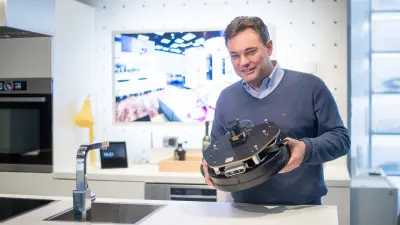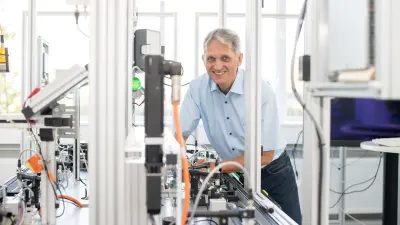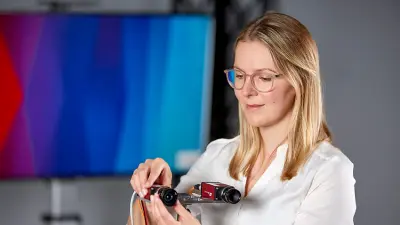Dr. Ralph Lange
Strategic Portfolio Owner of Robotics and Chief Expert for Robotic Systems and Software Engineering

I’m not a roboticist by education but just few months after starting at Bosch Research in 2013, I took the opportunity to form the first project on robotics software engineering together with two colleagues. Since then, I have been addicted to robotics! I headed up several projects on software foundations for robotics (e.g., navigation, real-time, microcontrollers, decision making). And I coordinated our open-source contributions to ROS. In May 2023, I took over the lead of the robotics research portfolio. It is truly a great privilege for me to work with so many brilliant robotics researchers from Bosch locations all around the globe.
Please tell us what fascinates you most about research.
Research not only provides the opportunity to continuously explore the latest technological approaches, but also to break completely new ground, to advance human knowledge a little further and to develop completely new technologies. A key for me is interdisciplinary collaboration, in which completely new approaches to important problems can be researched. In industrial research, I can work closely with universities (and other public research organizations) and at the same time make impactful contributions to products and services. This translation of research results into something very tangible fascinates me in particular.
What makes research done at Bosch so special?
First, the extremely broad spectrum of research topics. I regularly arrange lunch dates with colleagues from other departments to learn about very different research fields. Second is the opportunity to conduct research on completely new product ideas. There may not even be a suitable business unit for this, and we end up pitching our idea to our internal start-up platform.
Now, specifically on robotics research: Bosch is not a robotics company in the narrower sense, yet nevertheless has a uniquely broad robotics product portfolio. We offer robotics consumer products, act as a supplier and with engineering services in the professional service robotics market, and even offer solutions for industrial robotics. Research for such a broad product portfolio and leveraging technological synergies between these very different domains is a unique opportunity for roboticists that can hardly be found at any other company in the world.
What research topics are you currently working on at Bosch?
My team and I are currently focusing in particular on mobile robotics and handling on the shopfloor, i.e., on the material flow from logistics hubs to the point of use and vice-versa. In this field, we contribute specifically to products and software solutions by Bosch Rexroth.
The research topics we are working on are for example: 3D scene understanding with Gen AI, perception of humans, grasping, easy teach-in of handling tasks, customizable navigation, and instructing robots by natural language.
For fleets of robots, we research on multi-agent path finding (MAPF) in very dynamic environments. We also work on robotics-specific research questions in systems and software engineering, such as the verification of decision making by autonomous robots. The close cooperation with the open-source community around the Robot Operating System (ROS) is outstanding in this context.
What are the biggest scientific challenges in your field of research?
A largely unsolved problem in robotics is safety in close human-robot interaction. Of course, there has been great progress in the last two decades, particularly through the rise of cobots. But we are still a long way from robots that can safely work closely with humans on dangerous tasks or with large forces, as one would collaborate with a human colleague.
A second rather new challenge is the robustness of GenAI-based robotic systems. GenAI opens up completely new applications because the robots no longer need to be trained for specific situations during development. You have undoubtedly seen many impressive videos of particularly humanoid robots using such AI. At the same time, many scientists emphasize that the results of GenAI (e.g., ChatGPT) should always be checked with common sense. The question is how an autonomous robot can assess for itself how confident or uncertain it is in its knowledge and decisions and act with appropriate caution.
And obviously, these two questions are closely linked.
How do the results of your research become part of solutions “Invented for life”?
The United Nations expects global population growth to slow down and the population to peak in the 2080s. The fact that the world's population is not growing immeasurably is of course a good thing but comes with many challenges for society. One particularly major challenge is the shortage of labor, which is already causing considerable problems in many developed countries. If we as a society want to ensure that in future there is sufficient personnel available for social, educational, and care sectors, we need to automate the other areas much more. The key to this is robotics.
Curriculum vitae
Since 2023
Head of the robotics portfolio at Bosch Research
Since 2022
Chief Expert for Robotic Systems and Software Engineering
2013 – 2022
Research engineer and senior project manager for several projects on robotics software engineering and mobile robotics at Bosch Research
2010 – 2012
CAD/CAM software developer at TRUMPF Machine Tools
2005 – 2010
PhD in distributed context-aware systems at University of Stuttgart

Selected publications

Fernández et al. (2024)
- José Antonio Fernández, Ralph Lange, Stefan Laible, Kai Oliver Arras, Jan Bender
- Proc. of IEEE Int'l Conf. on Robotics and Automation (ICRA 2024), Yokohama, Japan

Belsare et al. (2023)
- Kaiwalya Belsare, Antonio Cuadros Rodriguez, Pablo Garrido Sánchez, Juanjo Hierro, Tomasz Kołcon, Ralph Lange (corresponding author), Ingo Lütkebohle, Alexandre Malki, Jaime Martin Losa, Francisco Melendez, Maria Merlan Rodriguez, Arne Nordmann, Jan Staschulat, Julian von Mendel
- Anis Koubaa (ed.) Robot Operating System (ROS): The Complete Reference (Volume 7), Springer, pp. 3–55

Blass et al. (2021)
- Tobias Blass, Arne Hamann, Ralph Lange, Dirk Ziegenbein, Björn B. Brandenburg
- Proc. of 27th IEEE Real-Time and Embedded Technology and Applications Symposium (RTAS 2021)

Lange et al. (2020)
- Ralph Lange, Silvio Traversaro, Oliver Lenord, Christian Bertsch
- Anis Koubaa (ed.) Robot Operating System (ROS): The Complete Reference (Volume 5), Springer, pp. 187–231
Get in touch with me
Dr. Ralph Lange
Strategic Portfolio Owner of Robotics and Chief Expert for Robotic Systems and Software Engineering



